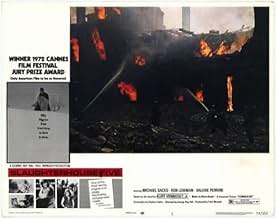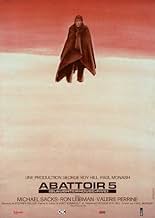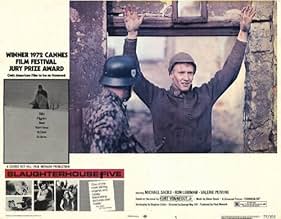Billy Pilgrim has mysteriously become unstuck in time. He goes on an uncontrollable trip back and forth from his birth in New York to life on a distant planet and back again to the horrors o... Read allBilly Pilgrim has mysteriously become unstuck in time. He goes on an uncontrollable trip back and forth from his birth in New York to life on a distant planet and back again to the horrors of the 1945 fire-bombing of Dresden.Billy Pilgrim has mysteriously become unstuck in time. He goes on an uncontrollable trip back and forth from his birth in New York to life on a distant planet and back again to the horrors of the 1945 fire-bombing of Dresden.
- Director
- Writers
- Stars
- Awards
- 3 wins & 4 nominations total
- German Leader
- (as Friedrich Ledebur)
- Young German Guard
- (as Nick Belle)
- Director
- Writers
- All cast & crew
- Production, box office & more at IMDbPro
Featured reviews
This flawed movie was a cult classic since its release because legions of Vonnegut fans were so fond of the novel that they could overlook the film's flaws. This is probably the only Vonnegut novel to make the transition to the screen as a movie that more than a handful of people are willing to watch. And they watch it again and again. I am reminded of Voltaire lovers who enjoy Leonard Bernstein's Candide. This seems to be the best of all possible Vonnegut movies.
There is a wealth of trivia associated with the cast. Michael Sacks disappeared into obscurity. Sharon Gans joined a community theater company that seemed more like a cult. Holly Near became a feminist folksinger. Valerie Perrine would later give a great performance as Honey Bruce in Bob Fosse's Lenny. Perry King and Ron Liebman became minor stars.
The story is largely allegorical. It is not science-fiction. Vonnegut is coping with the trauma of World War II, particularly the horrors he witnessed during the firebombing of Dresden. Billy Pilgrim's emotional numbness and alientation are characteristic of combat fatigue or post traumatic stress. Despite the lack of a chronological plot, Billy Pilgrim's arc is linear.
To the uninitiated, being "unstuck in time" can be confusing. It's sort of like one's first encounter with hypertext. Perhaps, that's why the movie is better on the second or third viewing. The key to enjoying Slaughterhouse Five is to focus on the best scenes and performances -- much like Billy Pilgrim's advice on living.
Technically, the film uses the moments where Billy jumps in time as meaningful transitions. It interweaves lessons learned from one part of his life and applies it to the present moment (whenever that is). The film's real treasures are the supporting characters that surround Billy. It also vividly transports you to WW2, a semi-autobiographical account of Kurt Vonnegut's real life experiences in Dresden. The film is filled with anecdotes that present the film's other main theme, that life is indeed ironic.
I was deeply touched by this film, with it's ability to whisk you from scenes of horror to amusing 'Kodak moments'. The music poignantly represents these transitions, and helps to carry the film. In the end, you can accept his death, by having lived his life.
If there's a weak element of the film, it's the bombing itself. By never letting the audience see outside the bomb shelter Pilgrim was in (and if so, not making it vivid enough for me to remember it), the horror and sheer magnitude of the event is downplayed. Two hundred thousand people died in the destruction of one of the greatest, most majestic cities in all of Europe, and all we're given is a shaking camera. Those who've read the book know that the trajedy was conveyed all to well by Vonnegut's skillful, near-photographic descriptions of the event and its aftermath. Very little of it made it to the screen.
Aside from that, George Roy Hill does an excellent job of communicating the existential dread of what must have been thought to be an unfilmable novel. The fate of Pilgrim's wife through her reckless driving could have come off as tasteless black comedy, but any cheap laughs are thankfully avoided, and the sequence is as shocking as it is heartbreaking. The really far-out parts of the novel (the four-dimensional aliens, Vonnegut's conception of the future and the end of the universe) are done with complete seriousness; another director might have had a condescending approach to the material, and killed the magic. The novel, by itself, is one of the best I've ever read -- it gleefully trashes the rules of standard novel-making, narration, and continuity, and manages to tell a real whale of a tale (there's a lot of weird stuff to swallow in it.) When I saw Hill credited as director, I moaned in agony, recalling the headaches that were induced by his smug, syrupy box office smashes "Butch Cassidy and the Sundance Kid" and "The Sting." After those two, I gave up all hope in Hill, the same way I did with Richard Lester after "Petulia" and "Help!" By the end of the movie, however, I ate my words. It's a beautiful, thought-provoking, and enchanting film, and does justice to a fine novel.
The book is also brilliant, but none of Vonnegut's work is easily adapted to the medium of film. Not quite the task Cronenberg took on when he directed Burrough's Naked Lunch, but very similar in method.
S-5 exposes us to the life of Billy Pilgrim (Michael Sacks) and his many loves (his dog spot, his wife played by Holly Near and an actress played by Valerie Perrine), as he either blacks out and travels into the deep recesses of his memory experiencing the delusion of time travel or (as indicated by his occasional leaps forward in time), he actually has become 'unstuck in time.' Between trips back to Dresden during its WWII bombing and trips forward to the planet Tralfamador, it seems that Billy is constantly tripping. Yet he manages to build a successful and very normal American life despite his bizarre and uncontrollable time-travel habit.
The film illustrates the non-linear manner in which the book is written by skipping from time to time in a seemingly random manner, but it manages to do so without losing focus on Pilgrim, who is, in fact always living in the present regardless of what time he happens to be experiencing. Fantastic directoral method!
The film makes a lot of subtle, simple and very good points by making Billy - a quiet simple guy with an extraordinary set of circumstances in his life - a true hero simply because he is relatively nice, somewhat aloof, happy, and quite normal. Sacks' performance is spot-on.
This film is beautifully photographed, very well paced, perfectly directed and edited. The acting is all quite good, and comes from a well appointed cast mostly consisting of character actors. I was particularly impressed with Eugene Roche's excellent portrayal of Edgar Derby.
Highly recommended for the art-house crowd and friends of intelligent sci fi.
Did you know
- TriviaAlthough Kurt Vonnegut Jr.'s renowned refrain, "And so it goes", appears over 100 times in the novel, it it is not uttered even once in this film.
- GoofsWhen Billy Pilgrim is asked by the American soldiers, "Where's your rifle?", he replies that he doesn't have one because he's a chaplain's assistant. However, in the United States Army, the primary duty of the chaplain's assistant in a combat zone is to protect the chaplain, so all chaplain's assistants must carry rifles. Because Chaplains are considered ministers in uniform they are forbidden from carrying weapons even when in combat zone.
- Quotes
Billy Pilgrim: [in his sleep] You guys go on without me. I'll be alright.
Prof. Rumfoord: All he does in his sleep is quit, surrender, and apologize. I could carve a better man out of a banana.
- ConnectionsEdited into The Clock (2010)
- SoundtracksConcerto No. 5 for Harpsichord in F minor, BWV 1056 - 2nd movement 'Largo'
Written by Johann Sebastian Bach (as J.S. Bach)
Performed by Glenn Gould, Piano
Columbia Symphony Orchestra
Vladimir Goldschmann, Conductor
- How long is Slaughterhouse-Five?Powered by Alexa
Details
- Release date
- Country of origin
- Official sites
- Languages
- Also known as
- Slaughterhouse-Five
- Filming locations
- Prague, Czech Republic(as Dresden)
- Production company
- See more company credits at IMDbPro
Box office
- Budget
- $3,200,000 (estimated)
- Runtime1 hour 44 minutes
- Sound mix
- Aspect ratio
- 1.85 : 1


























